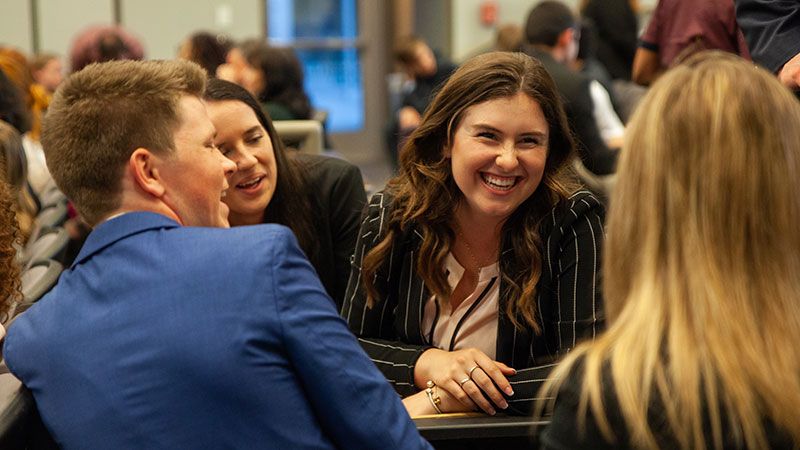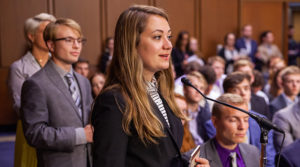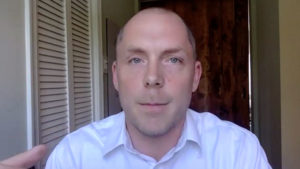
Each summer, TFAS D.C. Summer Programs give young leaders the opportunity to network with professionals in their field through exclusive site briefings, guest lectures and networking events. Although these must be held virtually this summer, TFAS students still benefit from the lasting connections and career guidance these opportunities provide.
In addition to internships and courses, from June 22-26, students participating in the TFAS Virtual Summer had the opportunity to attend a Professional Development Seminar on virtual networking, learn about the law school admission process from law students and recent graduates, and participate in career exploration small group discussions on intelligence careers, political appointments, marketing, breaking news and more.
Students also heard from key professionals in their program track fields during a series of special guest lectures on Tuesday, June 26. These lectures give students the chance to make vital career connections and gain firsthand knowledge through discussion sessions and networking opportunities. Each week for the remainder of the summer program, TFAS students will continue to hear from a variety of speakers including top economists, journalists, policy makers, scholars and industry experts.
Read below for a summary of last week’s special guest lectures:
CRIMINAL JUSTICE REFORM DISCUSSION WITH PRISON FELLOWSHIP STRATEGIST

Public Policy + Economics program track students heard from David Jimenez, the Federal Legislative Strategist at Prison Fellowship. Prison Fellowship is the nation’s largest nonprofit serving prisoners, former prisoners, and their families, and a leading advocate for justice reform.
During the lecture, Jimenez gave an overview of Prison Fellowship’s policy research and programs, and shared important milestones in criminal justice reform history including the Fair Sentencing Act, “ban the box” laws, and most recently, “The First Step Act.” He explained the intricate processes behind policy reform, and highlighted how bipartisan support and collaboration can lead to positive outcomes.
Following the lecture, students participated in an engaging Q&A session with Jimenez to discuss current events in reform, including restorative justice approaches, new efforts in reforming qualified immunity laws and how reentry programs must navigate a new economic landscape following the pandemic.
A Q&A SESSION WITH NEW YORK TIMES INVESTIGATIVE JOURNALIST
Students in the Journalism + Communications program track also participated in an exclusive Q&A session with world-class investigative reporter, Ian Urbina. A contributing writer to the New York Times, The Atlantic and National Geographic, Urbina’s most popular series, “The Outlaw Ocean,” uncovers an array of offshore crimes and inhumane activity, ranging from illegal fishing to sea slavery.
The biggest takeaway from Urbina’s lecture for me was having someone so accomplished make the field I one day hope to enter feel attainable.” – Betty Araya ’20
As an investigative journalist since 2003, Urbina started “The Outlaw Ocean” in 2015 to tell important stories about criminal activity amongst 56 million of the world’s offshore workers–a demographic that Urbina considers to be largely invisible in the media.
“Few places on the planet are as lawless as the high seas,” Urbina says in a feature video on the project. “The ocean is a place of amazing beauty, but it’s also this dystopian realm where severe inhumanities occur and often with impunity.”

Urbina gave students advice on pursuing a career in investigative journalism, emphasizing the importance of a reporter’s duty to deliver the truth despite ideological or cultural differences.
TFAS student Betty Araya ’20 said having the opportunity to ask Urbina questions about his work made her long-term career goals seem more achievable.
“The biggest takeaway from Urbina’s lecture for me was having someone so accomplished make the field I one day hope to enter feel attainable,” Araya said. “The investigative reporting Ian Urbina does is what I believe to be some of the most important work, and getting wisdom from his experience lets me visualize where I could start.”
Urbina has hosted TFAS interns in the Journalism + Communications program track for over 10 years, many of whom have assisted with research on “The Outlaw Ocean” project.
“CRONY CAPITALISM” LECTURE BY TIM CARNEY

Tim Carney, Novak ’03, also spoke to students in the Business + Government Relations program track on Tuesday on “Crony Capitalism.” During the lecture, Carney shared insight on the many ways businesses lobby, and explained how some groups have “crossed the line” in the moral goal of creating profit.
“I’m not someone who criticizes all lobbying,” Carney explained to the students. “But to lobby for special treatment is unjust, immoral and it underlines the very purpose and moral justification of the pursuit of profit.”
He went on to provide examples of insurance groups, manufacturers and health care groups who sought special interest for their own entities over the best interest of the customers or members.

Following the lecture, students engaged in a lively discussion with Carney on the ethical dilemmas between profit and positive social outcomes for organizations and learned how Carney became a passionate journalist interested in uncovering truth.
Carney’s 2003 Robert Novak Journalism Fellowship project, “Regulatory Robber Barons,” allowed him to write his first book, “The Big Ripoff: How Big Business and Big Government Steal Your Money” which launched Carney’s career as a respected journalist and commentator on economic competition, cronyism and American civil institutions. Currently, Carney is the commentary editor at the Washington Examiner and a resident fellow at the American Enterprise Institute.
“Russian Revanchism” with Ambassador Jonatan Vseviov
Estonian Ambassador to the United States Jonatan Vseviov spoke to the International Affairs program track students on “Russian Revanchism,” giving an insider look a foreign policy and current events between Russia, Estonia and the U.S.
Before assuming his current duties, Vseviov worked at the Estonian Ministry of Defense for 10 years, rising to the post of Permanent Secretary. Until his appointment as Permanent Secretary in January 2016, Mr. Vseviov served as the Undersecretary for Defense Planning, the Acting Undersecretary for Defense Policy, and Director of Policy Planning.
These lectures represent only a sampling of the top-notch programming TFAS students participate in each week. For more information on the 2020 TFAS Virtual Summer, visit TFAS.org/VirtualSummer.

